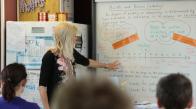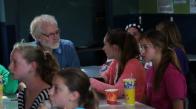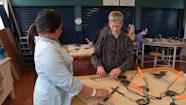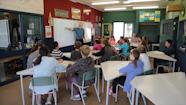Brenda Whycherley and Vanessa Austin of Edgecumbe College approach food technology and science with a holistic view.
Food technology and science
Transcript
Brenda Whycherley: When I took food tech at school, we did all these things, (for example) creaming and beating, but we didn’t know why we did them. So that’s my big push.
For the food, I’m trying to look at the food really holistically, and trying to make the most of every opportunity for literacy, numeracy, and science in our programme. In particular the science. I think it’s really important that the students make the connection with the technology and the science. They know that if they don’t put baking powder into a cake it won’t rise, but they don’t know what the baking powder actually does in the cake.
So what have you used in your hokey pokey biscuits?
Student: We’ve used baking soda and golden syrup.
Brenda Whycherley: Good, which of those ingredients was your acid?
Student: The golden syrup.
Brenda Whycherley: And which of the ingredients was your base?
Student: The baking soda.
Brenda Whycherley: Good, and when you put the two of them together, what happens?
Student: It makes carbon dioxide, and a chemical reaction.
Brenda Whycherley: Perfect. OK so therefore your biscuits will…?
Student: Rise.
Brenda Whycherley: Well done. Today we’ve been doing acids and bases because that’s a big part of the food safety. They contaminated an agar plate each, and we’ve incubated those and next week they’ll be able to see what they’ve grown. When I used to teach 10 years ago, you were teaching a skill and you had basically 45 minutes to teach that skill. Now I’m not just looking at the skills I’m looking at everything that is happening around that.
Vanessa Austin: Within the senior school here at Edgecumbe College we’ve been implementing a three year change from home economics to food technology. We have been doing a lot of processing, we’ve been doing a lot of work in the junior school as well, to try and get the students ready. Coming in through from year 7 to year 13. We’ve just done a huge range of breads in one of our processing standards; we did brioche and bagels, donuts, a simple white bread, and it was really good because the students worked in class to see the different tests and how the processing worked from whoa to go and they got a better idea and understanding. I’ve personally been working with Steve Jeffares and Brenda Whycherley quite a lot and they’ve been helping me create a programme. One that flows from year 7 to year 13 and also that reflects the new standards in food technology. We’re starting to see some really good results in food technology. Especially from last year through to this year, for example class sizes have jumped, the student knowledge is huge, the year 11s from last year who are now doing food technology in year 12, they have a better understanding, they are more capable in the standards, they can process quite happily by themselves.
Student: It helps us understand what is actually really happening, and now we know what to look for when we’re making other dishes.
Vanessa Austin: The students will be doing processing at year 13, and we’re just trying to build up their toolkit, so that when they leave the college at the end of the year 13 they’ll be able to go off into food technology courses or maybe even to work at local Fonterra.
Related videos
Food technology and science (03:47)
Brenda Whycherley and Vanessa Austin of Edgecumbe College approach food technology and science with a holistic view.
Building relationships with students visiting a technology centre (03:05)
Steve Jeffares and Brenda Whycherley show that building strong relationships develops confidence for their students.
A broad technology programme for year 7–8 (02:00)
Steve Jeffares and Brenda Whycherley inspire confidence in their students by offering a broad programme.
High expectations in years 7–8 technology (03:57)
Steve Jeffares shares how he inspires students to develop a love of learning.




